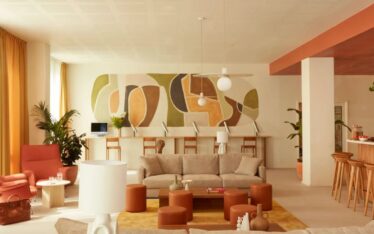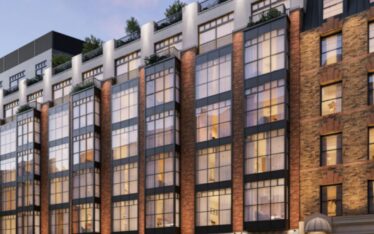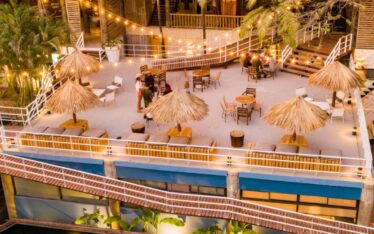This article is an extract from Stay the Night‘s white paper, ‘The future of hospitality: Why 2021 is the year of the hybrid’.
What is hybrid hospitality? Where did the hybrid model come from? And what can this tell us about where it’s heading?
DEFINING HYBRID HOSPITALITY
Hybrids are dynamic, multifunctional spaces where people can stay, work, eat and drink, and socialise all under one roof. The term incorporates hotels, hostels, coliving and coworking spaces, as well as restaurants, bars and more. Many also offer a programme of activities as part of the overall experience, from morning yoga sessions to cocktail masterclasses.
Programming is often community-led and hybrids generally foster a deeper connection with the neighbourhoods they are in. At the core of hybrid hospitality is community – sites can create a space where people connect, collaborate and feel at home, together.
Now more than ever, people are seeking connection and authentic relationships with both the people – and brands – around them. The hybrid concept offers brands the ability to bring people together to create the community so many are looking for.
As well as responding to consumer demands, the hybrid model makes business sense for brands. The concept is a key way to optimise spaces for revenue – it allows operators to apply different business models on the same square metres of land.
By diversifying revenue streams and providing spaces for both tourists and locals, the hybrid model allows businesses to maximise profits, reduce risk and provides more financial stability than the typical cookie-cutter hotel.
This has never been more important – businesses with multiple revenue streams already in place have been in a better position to withstand the negative effects of this year’s COVID-19 pandemic.
That’s why, we believe that the hybrid model is set to become a permanent new form of hospitality.
THE EVOLUTION OF THE HYBRID MODEL
Historically, the focus of a hotel was on the room itself and its ability to create a homely living space for guests to reside in. However, behaviours began to shift as millennials reached adulthood and their spending power increased. This demographic were no longer content with checking in and relaxing in their room and instead sought opportunities for deeper connections, both with their destination and their fellow guests. They demanded more from their stay – and lifestyle hotels like The Hoxton and Ace Hotels rose to the challenge.
One way they did this was by activating the lobby – instead of being a place where guests passed through on their way in and out of the hotel, lobbies became buzzing hubs designed to foster social interaction. They also placed an emphasis on high quality food and beverage offerings – once an afterthought, F&B became a key revenue driver and opened up lifestyle hotels to the local market. This innate ability to develop in response to rapidly changing consumer demands has seen the lifestyle hotel concept thrive, transforming people’s perception of what a hotel can be.
As this sector changed, so too did the hostel industry. Hostels were already succeeding in cultivating vibrant communities and providing unique experiences, but struggled with being perceived as a low-budget – and by extension, low-quality – offering. While hotels were busy shifting their focus to fostering sociability, hostels were upgrading their spaces, investing in F&B and adopting a more design- led approach. Generator are a great example of this and their growing brand profile helped change the way the media portrayed the hostel industry.
This transformation brought attention from investors to the sector and bigger players began to move into this space, with hotel giants like Accor and Hilton launching their own hostel-based concepts. New terms came into play, including ‘poshtel’ and ‘boutique hostel’, but guests remained more interested in the experience than the tagline.
At the same time, coliving and coworking concepts began to rapidly grow in popularity as the boundaries between work, life and play blurred. Over the past decade, we have seen a rise in the popularity of coliving as leading brands including Common, Node and The Collective began responding to the economic and social challenges faced by younger generations in an urban environment. Soaring house prices, a desire for flexibility and a growing loneliness epidemic are just a few of the issues that coliving brands are attempting to address through the provision of modern, shared living spaces with community at the core.
This shift represents not only a practical change to the way people live, but a change in their mindsets which is no longer limited to younger generations. People of all ages are looking beyond societal norms and embracing the opportunity to design their lives in a way that suits their individual needs.
The merging of these various concepts has birthed the hybrid model and redefined the way we think about hospitality. The recent pandemic has accelerated this fusion of concepts by forcing businesses to think outside the box to get more out of each square metre of their space. Businesses under each of these umbrellas – hotels, hostels, coworking and coliving spaces – have pivoted their models to maximise revenue and stay relevant to consumers during this difficult period.
TO CONCLUDE
People’s lifestyles are evolving – the distinction between where we stay, work, and play is blurring faster than ever before. As people demand more from the hospitality experience, hybrids are in a strong position to meet this new consumer where they are.
Our view is that the innovation we have witnessed during the course of this year’s crisis will cement the hybrid model as the new norm in hospitality.
This article is an extract from Stay the Night‘s white paper, ‘The future of hospitality: Why 2021 is the year of the hybrid’.



